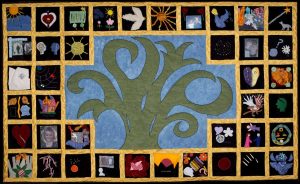Current Projects
WELCOME TO THE INTERACTIVE JUSTICE STORYTELLING QUILT

Each patch is a symbolic descriptive image produced by victims and offenders from across Canada. There are 40 blocks with 13 stories in French and 27 in English.
The purpose of the Quilt is to bring us together so that we may empathize with the suffering, hope, and courage of victims and offenders. May this Quilt inspire us and give us the courage to talk about the sorrowful events in our own lives.
The Church Council on Justice and Corrections is grateful to all of the people who made the Justice Storytelling Quilt become a reality.
* Meagan O’Shea is the primary artist
* Suzie and David Shantz quilted the pieces together
* David Nomura made the quilt “talk”
* Centre de services de justice réparatrice / Center for Services in Restorative Justice organized participants to come together to create the quilt.
* Forty brave people came forward to share their stories
* Moheb Hanna ensured the online quilt worked perfectly
* The Women’s Inter-Church Council of Canada provided the funds for this online project
CCJC is also grateful to those who thought up the concept of a Justice Storytelling Quilt, as well as those other artists who collaborated to make the quilt a reality.
We ask that you hold sacred the stories that you hear.
WARNING: Many of these stories are difficult to listen to and may trigger upsetting reactions.
Click here to view the interactive Justice Storytelling Quilt!
What is the Empathy Project?
CCJC is currently working on a project designed to cultivate empathy, among incarcerated individuals. CCJC’s Empathy Project consists of developing programs which promote healthy empathy skills through an examination of victim impact. These programs, running in prisons, aim to support successful community reintegration and improved community safety by helping incarcerated individuals to learn valuable lifeskills including training in compassion and empathy, education in cultural competency and cultural barriers, and developing a strong understanding of personal accountability for the harm created through criminal acts and the impacts for primary, secondary and community victims.
Elements of CCJC’s Empathy Project
*”Enhancing Empathy for Victims and Families of Offenders” With support from Public Safety Canada, in winter 2016 CCJC oversaw a project to train prison volunteers and chaplains to run victim impact programs in federal prisons across Canada. This project helped us learn more about how these programs affect participants, with a specific eye toward measuring participants’ interest in family reconciliation and their interest in restorative justice opportunities.
*‘Seeing Through the Bars’ panel discussion: In April, 2015, CCJC hosted a discussion on Victim Impact Programs in prisons featuring Kathryn Bliss (CCJC Education and Community Engagement Coordinator), Kate Johnson (Victim Impact Facilitator), Steve Sullivan (Victims Advocate), and Schuyler Playford (CCJC Victim Impact Project Manager). Click here to view a short teaser from the panel discussion. A video of the whole discussion is available here.
*Victim Impact Pilot Project: Click here to learn about CCJC’s 2014-15 pilot project with men in a federal prison.
*Victim Impact Program for Women: With support from the Women’s Inter-Church Council (WICC), CCJC undertook a pilot project to run and evaluate a Victim Impact Program with federally sentenced women in 2016. In 2017 began developing a curriculum for use in the Empathy Project, focused on the specific needs of women in prison and a Canadian Justice System context.
*Youth Victim Impact Program: In 2018, CCJC will continue to connect with stakeholders in order to develop a project that makes use of victim impact program tools to help at-risk youth build social and emotional skills.
Why focus on empathy?
Empathy is the experience of understanding another person’s condition, emotions, and thoughts from their perspective. Empathy helps people overcome a self-centered worldview. A deficit of empathy is linked to aggression and is one of the core ingredients in dysfunctional relationships. The Empathy Project works with incarcerated people through an educational program focusing on the impact their crime has had on others. This education in victim impact can help to improve deficits in empathy, with the goal of improving participants’ social outcomes upon release from prison.
Ultimately, the Empathy Project aims to enhance community safety through building social connections and mutual understanding.
Click here to view CCJC’s Reflection on Empathy video!
Please contact us us to learn more about how you can help the Empathy Project develop and grow.
